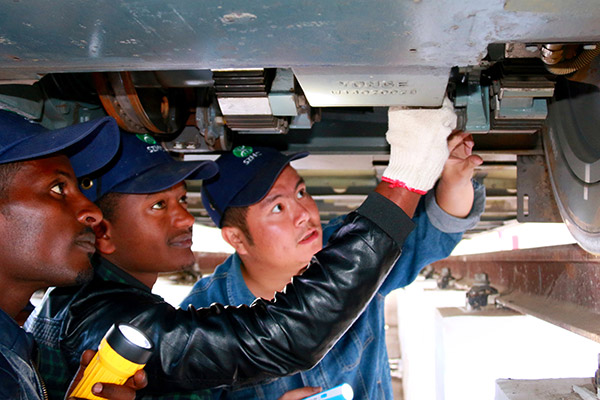
Qiu An, a trainer at Shenzhen Metro, shares rail vehicle maintenance tips with two local colleagues in Addis Ababa, the capital of Ethiopia. (Photo provided to China Daily)
Shenzhen Metro is exporting urban rail management expertise to world
Shenzhen Metro Group Co Ltd, a State-owned urban railway operator in Guangdong province, is exporting its management expertise and its model of urban transportation service to economies participating in the Belt and Road Initiative.
Its first project involves two light railway lines totalling 34 kilometers in Addis Ababa, the capital of Ethiopia.
Established in 1998, Shenzhen Metro is the first Chinese metro firm to go global.
China Railway Group Ltd was contracted to undertake the project construction work in 2014.
Shenzhen Metro will be responsible for managing, operating, maintaining and training local staff in the first 41 months.
"The light rail transit will operate 16 hours per day, moving over 100,000 passengers on average," said Yuan Hulin, head of overseas business at Shenzhen Metro. "This will greatly relieve traffic jam on local streets."
On April 25, Shenzhen Metro and China Railway Group teamed up again for an urban railway system in Hanoi, the capital of Vietnam. For this project, Shenzhen Metro will act as a consultancy service, sharing its expertise in urban rail transportation.
The 13-km line with 12 stations is expected to open in 2018. The contract is worth about 89 million yuan ($13 million) with a service period of 16 months.
Shenzhen Metro will be responsible for compiling an operating system guide, preparatory consulting as well as comprehensive testing and adjusting of signals, drainage, communication and other facilities.
The project will help the company to gather experience in international consulting and form a professional integrated service system, said Lin Maode, president of Shenzhen Metro.
The company recently became one of the largest shareholders of China Vanke Co, one of China's largest property developers.
It is trying to deploy its expertise in realty-related operations in overseas projects, for the development and management of commercial properties on railway assets like station premises and track-side vacant plots.
According to its annual report, the firm's four real estate projects in China opened to the market in 2015 and realized sales revenue of 11.9 billion yuan.
Shenzhen Metro signed an agreement in November 2016 to build a suburban railway system in Ramadan, a satellite city near Egypt's capital Cairo.
The company will operate the railway and train staff for two years. It will undertake maintenance for 10 years and oversee integrated development of commercial land along the line.
"There are many land resources to develop along the railway lines and an increasing demand to establish more commercial facilities in such areas," Yuan said. "Our business model offers comprehensive utilization of land resources."
Shenzhen Metro is also exploring more overseas projects in Nigeria, Israel and other economies participating in the Belt and Road Initiative.
"Our strategy is to establish market-oriented mechanisms that entail minimum investment on overseas projects and pre-empt losses," said Yuan.
To deliver guaranteed quality on overseas projects, the company limits costs to contracted prices, he said.
"Currently, infrastructure construction has a dominant role, but the demand for related services will be tremendous in future," said Zhao Guangbin, senior economist of Shenzhen Qianhai PricewaterhouseCoopers Business Consulting Services Co Ltd.
Infrastructure projects such as airports, railways and nuclear power stations need people to operate and manage them after construction. So Shenzhen Metro's focus on services makes eminent sense, he said.
But challenges will ensue, he said. "Ninety percent of employers would be local residents. So culture, language, customs - they would need attention. So would key aspects like security."


















































